Photographs: J R Tokai/Reuters Shaikh Zoaib Saleem in New Delhi
Complex riders to land acquisition and lack of adequate physical infrastructure are among the major issues Japanese companies face in expanding their India operations or setting up new projects in the country, according to a study by the Confederation of Indian Industry and KPMG.
The report, to be released in Japan at the India-Japan Business Summit on the completion of 60 years of diplomatic relations, has termed infrastructure as the biggest bottleneck that has threatened the sustainability of India's economic growth.
"Significant deficits exist in most of the segments of infrastructure," the study said.
. . .
Japanese investors face land, infra hurdles in India
Image: Tokyo.Photographs: Courtesy, Wikimedia Commons
The two-day summit that begins on Wednesday, will be attended by Indian business representing various sectors.
India plans to improve its infrastructure and targets $1 trillion investment during the 12th five-year Plan that began this financial year, half of the likely investment is expected to come from the private sector.
The findings of the study came just a few days after a parliamentary standing committee said the government shouldn't acquire land for private industries and public-private partnership projects, a move that drew flak from the industry.
. . .
Japanese investors face land, infra hurdles in India
Image: Humanoid robot Seisaku-kun pedals a bicycle during a demonstration at the Combined Exhibition of Advanced Technologies (CEATEC) in Makuhari, northeast of Tokyo.Photographs: Toshiyuki Aizawa/Reuters
The issue of retrospective amendments to the Income Tax Act, a major issue whenever a delegation went to the United States or Europe, is not the case with Japan.
CII director general Chandrajit Banerjee told Business Standard, "This (the retrospective amendments) was not the primary issue that came up in the preliminary discussions with Japanese investors, held prior to the delegation visit."
The high-level delegation from India, led by CII President Adi Godrej, includes Vikram Kirloskar, vice-chairman of Toyota Kirloskar; Deepak Puri, CMD Moser Baer India; Arun Sawhney, CEO and MD of Ranbaxy Lab; T V Kamalak-annan, president, TCS; Avinash Vashistha, chairman and MD of Accenture India and Shardul Shroff, managing partner, Amarchand Mangaldas. Union minister for urban development, Kamal Nath, will accompany the delegation.
. . .
Japanese investors face land, infra hurdles in India
Image: An attendant shows Toshiba's new HD DVD notebook PCs at the Combined Exhibition of Advanced Technologies.Photographs: Toshiyuki Aizawa/Reuters
Banerjee said while the industry expected to strike some deals during the visit to Japan this week, some like IT-major Infosys are already in the process of making investments in Japan.
TCS is also looking forward to exploring opportunities in Japan, he said.
Industry will also explore learning from Japanese competitiveness and excellence in manufacturing, Banerjee said.
Under the Visionary Leaders for Manufacturing Programme between the two countries, over 300 potential CEOs in India have been trained by Padma Shri Shoji Shiba.
. . .
Japanese investors face land, infra hurdles in India
Photographs: Dollars.
The report is optimistic on the outcome of the Comprehensive Economic Partnership Agreement signed between India and Japan early last year.
Despite slow growth in Japan and low business confidence, Banerjee said it was a good time to go to Japan.
"One of the things that we need to understand is how to utilise the CEPA the most to our benefit," he added.
After CEPA, Japan has agreed to provide greater access for contractual suppliers, professionals such as accountants, researchers, tourist guides and management consultants who will now be able to provide their services in Japan, CII said in a note.
. . .
Japanese investors face land, infra hurdles in India
Image: An employee of the Tokyo Stock Exchange (TSE) works at the bourse in Tokyo.Photographs: Issei Kato/Reuters
Banerjee said Japan has vast opportunities in information technology services, life-sciences and pharmaceuticals in Japan.
The delegation would also explore opportunities for the Indian FMCG sector in Japan as the Indian FMCG players are optimistic that Japan would allow them some space soon, he said.
Under a current law in Japan, small and medium retailers are protected from the onslaught of large organised retail.
Bilateral trade stood at $13.8 billion in 2010-11, with the balance of trade in favour of Japan.

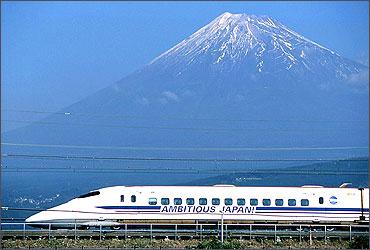
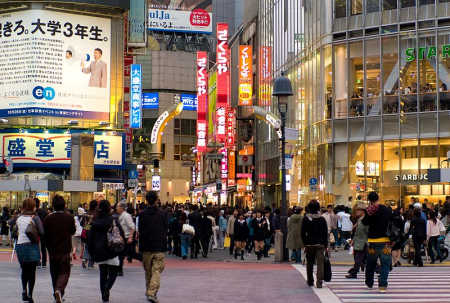
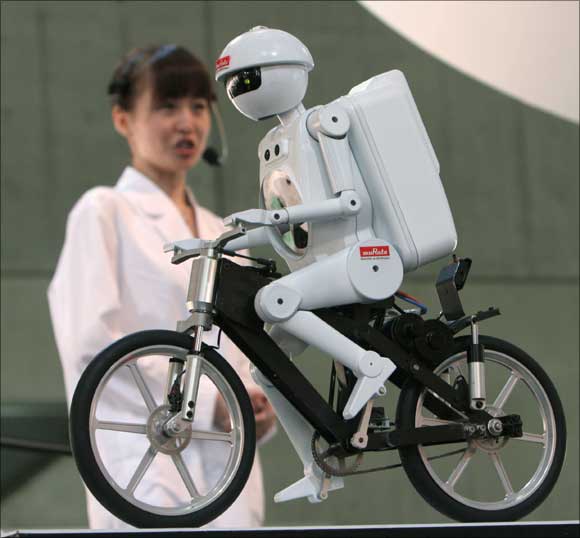
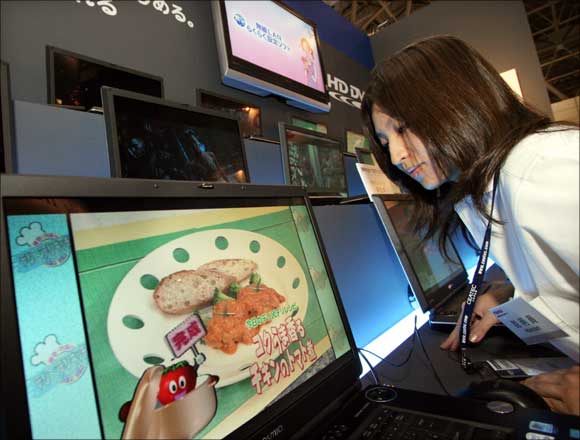

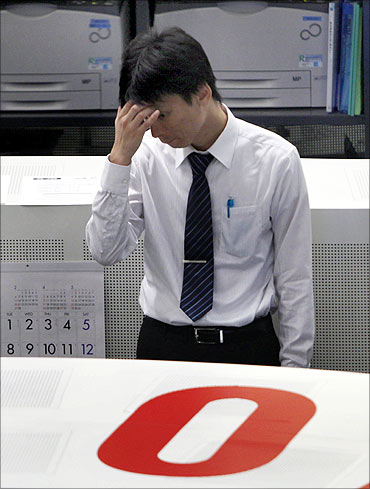

article